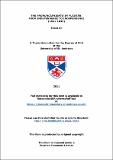Files in this item
The 'pronunciamiento' in Yucatán : from independence to independence (1821-1840)
Item metadata
| dc.contributor.advisor | Fowler, Will | |
| dc.contributor.author | Ali, Shara | |
| dc.coverage.spatial | 263 p. | en_US |
| dc.date.accessioned | 2011-03-17T12:08:32Z | |
| dc.date.available | 2011-03-17T12:08:32Z | |
| dc.date.issued | 2011-06-24 | |
| dc.identifier | uk.bl.ethos.552521 | |
| dc.identifier.uri | https://hdl.handle.net/10023/1693 | |
| dc.description.abstract | Unique to nineteenth-century Spain and Central America, the pronunciamiento can be interpreted as an act of insubordination against ruling authorities, which included a written document with a list of complaints or demands. The practice was almost always carried out by members of the army, but usually involved heavy participation by political and civilian sectors of society as well. The pronunciamiento more often than not contained a threat of military violence if the grievances of the pronunciados were not listened to; as a result, it carried with it the implicit consequence of armed revolt. The pronunciamiento was responsible for major political changes in early nineteenth-century Mexico and Yucatán, and was also one of the most powerful forces of political and societal destabilisation during this period. Indeed, the pronunciamiento was responsible for the establishment of federalist and centralist systems, changes of constitutions, and constant overthrows of presidents. This was also true on a smaller scale in Yucatán, as the pronunciamiento was not only used to depose governors and administrations, but was the key negotiatory mechanism between the Yucatecan and Mexican administrations; yucatecos resorted to the pronunciamiento to realise their secessions from and reunifications to Mexico throughout the early nineteenth century. The aim of this thesis is to expose the dynamic of the Yucatecan pronunciamiento. It will challenge the present depiction of the pronunciamiento as military exercise of destabilization, and will instead concentrate on exposing it as a highly intricate process of political representation and negotiation, at both local and national levels. This will not only contribute toward a greater understanding of pronunciamiento culture on a local and more general scale, but will also reveal a more comprehensive analysis of the socio-political and economic circumstances of nineteenth-century Yucatán. This in turn will aid in re-defining early nineteenth-century Mexico, questioning its traditional depiction as an age of “chaos”, and instead exposing it as one dominated by political and ideological forces and factions, who used the pronunciamiento to express their beliefs and to negotiate for change. | en_US |
| dc.language.iso | en | en_US |
| dc.publisher | University of St Andrews | |
| dc.rights | Creative Commons Attribution-NoDerivs 3.0 Unported | |
| dc.rights.uri | http://creativecommons.org/licenses/by-nd/3.0/ | |
| dc.subject | Pronunciamiento | en_US |
| dc.subject | Yucatan | en_US |
| dc.subject | Mexico | en_US |
| dc.subject | Political culture | en_US |
| dc.subject | Nineteenth century | en_US |
| dc.subject | Political history | en_US |
| dc.subject.lcc | F1376.A6 | |
| dc.subject.lcsh | Yucatán (Mexico : State)--Politics and government--19th century | en_US |
| dc.subject.lcsh | Yucatán (Mexico : State)--History--19th century | en_US |
| dc.subject.lcsh | Political culture--Mexico--Yucatán--History--19th century | en_US |
| dc.subject.lcsh | Political violence--Mexico--Yucatán--History--19th century | en_US |
| dc.subject.lcsh | Revolutions--Mexico--Yucatán--History--19th century | en_US |
| dc.subject.lcsh | Government, resistance to--Mexico--Yucatán--History--19th century | en_US |
| dc.title | The 'pronunciamiento' in Yucatán : from independence to independence (1821-1840) | en_US |
| dc.type | Thesis | en_US |
| dc.type.qualificationlevel | Doctoral | en_US |
| dc.type.qualificationname | PhD Doctor of Philosophy | en_US |
| dc.publisher.institution | The University of St Andrews | en_US |
This item appears in the following Collection(s)
Except where otherwise noted within the work, this item's licence for re-use is described as Creative Commons Attribution-NoDerivs 3.0 Unported
Items in the St Andrews Research Repository are protected by copyright, with all rights reserved, unless otherwise indicated.


